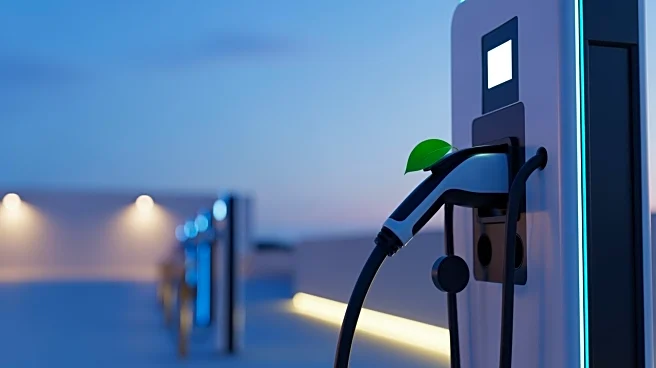What's Happening?
ISO New England has commenced a transitional cluster study involving 26 interconnection requests, which collectively represent a summer rated capacity of approximately 8 gigawatts. This study includes 21 battery energy storage projects, two solar projects, and three
wind projects, predominantly located in Massachusetts. The largest project in this study is SouthCoast Wind 1, with a capacity of 1,200 megawatts, selected by Massachusetts and Rhode Island in a coordinated procurement effort in 2024. Additionally, the study features a 706 megawatt battery project in Bristol, Massachusetts, and several other projects rated at 200 megawatts or greater. This initiative follows Federal Energy Regulatory Commission orders aimed at addressing interconnection queue backlogs by prioritizing non-speculative projects. The ISO has implemented a 'first-ready, first-served' process, studying all interconnection requests as a group or cluster.
Why It's Important?
The launch of this cluster study by ISO New England is significant as it represents a strategic shift in how interconnection requests are managed, potentially accelerating the integration of renewable energy sources into the regional grid. By prioritizing projects that are ready for development, the ISO aims to reduce delays and improve efficiency in the interconnection process. This could lead to increased renewable energy capacity in New England, supporting state and regional goals for clean energy transition and reducing reliance on fossil fuels. The study's focus on battery storage projects also highlights the growing importance of energy storage in balancing supply and demand, enhancing grid reliability, and facilitating the integration of intermittent renewable resources.
What's Next?
The transitional cluster study is expected to be completed by August 2026, with the request window for the first full cluster study opening in October 2026. Developers involved in the study must meet increased financial and site control requirements, and face potential penalties for withdrawing projects from the queue. ISO New England and transmission owners may also face penalties for delays in future cluster studies. As the study progresses, stakeholders including state governments, energy developers, and environmental groups will likely monitor its outcomes closely, assessing its impact on regional energy policy and infrastructure development.
Beyond the Headlines
The implementation of a cluster study approach by ISO New England could set a precedent for other regions facing similar interconnection challenges. By streamlining the process and focusing on projects with higher readiness levels, this approach may encourage more efficient development of renewable energy infrastructure across the U.S. Additionally, the emphasis on battery storage projects reflects a broader trend towards enhancing grid resilience and flexibility, which is crucial for accommodating the increasing share of renewable energy in the power mix.















